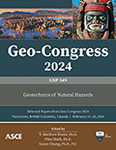Evolution of Seismic Fragility Curves (SFC): Configuration and Application for Underground Infrastructure Projects Subjected to Earthquake Hazard
Publication: Geo-Congress 2024
ABSTRACT
In the northwestern Himalayan region of Jammu and Kashmir, earthquakes of moderate to large magnitude were common. The development of infrastructure projects in this region has accelerated over the last two decades. Earthquake-resistant structural elements of any development project are extremely difficult to design, especially in seismically active areas. The seismic fragility curves for various tunnels located in three phases of the Udhampur Srinagar Baramulla Rail Link (USBRL) Project were developed in this paper. According to the findings of this study, the majority of the tunnels in Phase 1 of this project are subject to extensive damage. Active tectonic sources in the near field, weathered rock conditions, high seismicity, and landslide vulnerability all contributed to portal damage and significant lining failure at such sites. This research will aid design engineers in their advocacy for earthquake-resistant tunnels and underground facilities in Jammu and Kashmir. It will pave the way for the design of earthquake-resistant infrastructure projects in the Himalayas.
Get full access to this article
View all available purchase options and get full access to this chapter.
REFERENCES
Ansari, A., Rao, K. S., and Jain, A. K. (2022). “Seismic Analysis of Shallow Tunnels in Soil Medium.” In Stability of Slopes and Underground Excavations (pp. 343–352). Springer, Singapore. https://doi.org/10.1007/978-981-16-5601-9_29.
Ansari, A., Rao, K. S., and Jain, A. K. (2022a). “Seismic vulnerability of tunnels in Jammu and Kashmir during post-seismic functionality.” Geotechnical and Geological Engineering, 40(11), 1–26. https://doi.org/10.1007/s10706-022-02341-0.
Ansari, A., Rao, K. S., and Jain, A. K. (2023). “Seismic response and fragility evaluation of circular tunnels in the Himalayan region: Implications for post-seismic performance of transportation infrastructure projects in Jammu and Kashmir.” Tunnelling and Underground Space Technology, 137, 1–13. https://doi.org/10.1016/j.tust.2023.105118.
Ansari, A., Rao, K. S., Jain, A. K., and Ansari, A. (2022b). “Deep Learning Model for Predicting Tunnel Damages and Track Serviceability under Seismic Environment.” Modeling Earth Systems and Environment, 8(4), 1–20. https://doi.org/10.1007/s40808-022-01556-7.
Ansari, A., Zaray, A. H., Rao, K. S., Jain, A. K., Hashmat, P. A., Ikram, M. K., and Wahidi, A. W. (2023a). “Reconnaissance surveys after June 2022 Khost earthquake in Afghanistan: Implication towards seismic vulnerability assessment for future design.” Innovative Infrastructure Solutions, 8(3), 1–15. https://doi.org/10.1007/s41062-023-01077-x.
Ansari, A., Rao, K. S., and Jain, A. K. (2023b). “Application of Microzonation Towards System-Wide Seismic Risk Assessment of Railway Network.” Transportation Infrastructure Geotechnology, 10(3), 1–24. https://doi.org/10.1007/s40515-023-00317-y.
Ansari, A., Rao, K. S., and Jain, A. K. (2023c). “Seismic microzonation of the Himalayan region considering site characterization: Application towards seismic risk assessment for sustainable tunneling projects.” Natural Hazards Review ASCE https://doi.org/10.1061/NHREFO/NHENG-1815.
Argyroudis, S. A., and Pitilakis, K. D. (2012). “Seismic fragility curves of shallow tunnels in alluvial deposits.” Soil Dynamics and Earthquake Engineering, 35, 112.
Hashash, Y. M., Hook, J. J., Schmidt, B., John, I., and Yao, C. (2001). “Seismic design and analysis of underground structures.” Tunnelling and Underground Space Technology, 16 (4), 247–293. https://doi.org/10.1016/S0886-7798(01)00051-7.
Srivastav, A., Satyam, N., and Rajan, K. S. (2022). “Seismic Vulnerability Assessment of Steel Fiber Reinforced Shotcrete Lined (SFRS) Tunnel: A Himalayan Case Study.” Journal of the Geological Society of India, 98 (2), 185–192. https://doi.org/10.1007/s12594-022-1957-6.
Wang, Y. H., Tang, Q., Su, M. N., Tan, J. K., Wang, W. Y., Lan, Y. S., Luo, W., and Zhou, Y. (2020). “Post-earthquake fire performance of square concrete-filled steel tube columns.” Thin-Walled Structures, 154, 106873. https://doi.org/10.1016/j.tws.2020.106873.
Wani, A. R., and Alamgir, J. (2017). “Murre formation and geological problems encountered and mitigation thereof.” Him Prabhat IX:11–23.
Yusoff, R., and Adhikari, K. N. (2017). “Geological studies for construction of T-74R- problems and solutions.” Him Prabhat VIII:28–47.
Information & Authors
Information
Published In
History
Published online: Feb 22, 2024
ASCE Technical Topics:
Authors
Metrics & Citations
Metrics
Citations
Download citation
If you have the appropriate software installed, you can download article citation data to the citation manager of your choice. Simply select your manager software from the list below and click Download.
